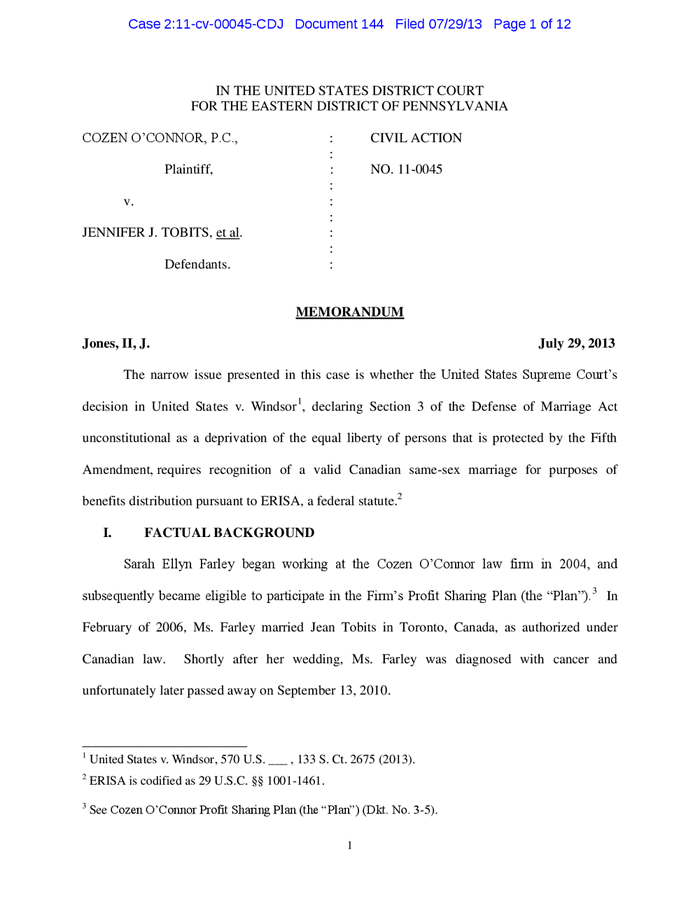
WASHINGTON — A federal judge Monday ordered that a private company's retirement plan be interpreted to include coverage for the same-sex wife of a woman who had worked for the company as the "surviving spouse" under the plan.
Judge C. Darnell Jones II, a federal judge in Pennsylvania, reached his decision by applying the recent Supreme Court ruling opening the door for federal recognition of married same-sex couples to an existing federal law that provides tax benefits for private companies' retirement plans that meet the federal standards, called the Employee Retirement Income Security Act (ERISA).
Jones noted that ERISA was aimed at "establish[ing] national uniformity among [employee retirement] benefit plans," and then examined the impact of the Supreme Court's June decision in United States v. Windsor striking down the federal ban on recognizing gay couples' marriages in the Defense of Marriage Act on so-called "ERISA-qualified plans."
"Prior to the Court's decision in Windsor," he wrote, "under the plain language of ERISA, the [tax] Code, and the Plan at issue in this case, qualified retirement plans were under no obligation to provide benefits to same-sex Spouses. Following the Court's ruling, the term 'Spouse' is no longer unconstitutionally restricted to members of the opposite sex, but now rightfully includes those same-sex spouses in 'otherwise valid marriages.'"
ERISA, which "establish[es] a floor for privately sponsored employee benefit plans with respect to spousal benefits," Jones wrote, had previously excluded same-sex couples. "Windsor leveled the floor," he concluded.
In this case, Sarah Ellyn Farley had worked for Cozen O'Connor, a law firm based out of Pennsylvania, during which time she married Jennifer J. Tobits in Canada. The couple lived in Illinois until Farley's death in 2010. Farley's parents and Tobits both sought payment of the death benefit under O'Connor's profit-sharing plan.
After deciding that Windsor opened the federally qualified plans to inclusion of same-sex couples, Jones — appointed to the bench by President George W. Bush — found that O'Connor had intended to reap the benefits of being an ERISA-qualified plan and accordingly would provide the benefit to Tobits if she was the "surviving spouse."

The final, and most complex question, is whether the couple — married in Canada, with the employee working for a Pennsylvania-based company, and living in Illinois — had an "otherwise valid marriage."
Examining the law, Jones stated, "There can be no doubt that Ms. Tobits is Ms. Farley's 'surviving Spouse' under the Plan in light of the Supreme Court's decision in Windsor."
He went on, however, to muddy those waters by stating somewhat contradictorily, "Post-Windsor, where a state recognizes a party as a 'Surviving Spouse,' the federal government must do the same with respect to ERISA benefits," and, "The issue here regards the definition of 'Spouse' as supplied by ERISA — a federal regulation."
Jones first concluded that the laws of Pennsylvania — which has a statute barring same-sex couples from marrying — were irrelevant in this situation because the firm's plan was intended to be covered by ERISA, and, under ERISA, what matters is only if the couple is legally married, not if the state where the company is based recognizes that marriage.
Jones then appeared to tie his ultimate conclusion that Tobits is the "surviving spouse" under the benefits plan to a finding that, "Illinois, the couple's place of domicile, would consider Ms. Tobits Ms. Farley's 'surviving Spouse.'" Jones did so, moreover, by stating in a footnote, "As this Canadian marriage was deemed valid, albeit under the nominal title of 'civil union' in Illinois, there can be no dispute that Ms. Tobits is a 'surviving Spouse' pursuant to the Plan."
Shannon Minter, the National Center for Lesbian Rights attorney representing Tobits, said the ruling was as broad as Jones had begun describing in his decision — that it applied to all legally married same-sex couples.
"Today's decision is not only a victory for Jennifer and Ellyn, it is a victory for every married same-sex couple in the country. No longer can employers hide behind DOMA to deny equal benefits to some employees solely because their spouse is a person of the same sex," Minter said in a statement.
The ruling echoes the outcome recommended by the Department of Justice in a December 2011 filing in the case that was made before the Supreme Court ruled on DOMA's constitutionality. "Section 3 of DOMA fails heightened scrutiny, and this Court should determine that it does not prohibit Ms. Tobits from being recognized as Ms. Farley's spouse under the Cozen Plan," Justice Department lawyers wrote at the time.
Chris Stoll, another NCLR attorney on the case, compared the decision to the government's implementation of immigration law and federal employee health insurance benefits, saying, "We see this decision as showing that ERISA is going to be in that category of benefits that are included as long as the marriage was valid in the place of celebration, regardless of where the couple is."

